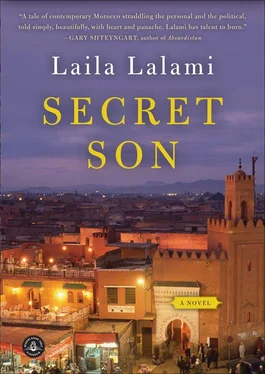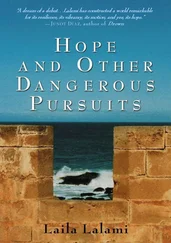“Ah,” Youssef said. “You’ll win her with your gentle touch?”
Amin looked slightly miffed, but in truth he could not really counter the remark. Among his friends, Youssef was perhaps the most popular with girls, and today he could not resist showing off. He told Amin about Alia, her beautiful figure, her luminous skin, her perfect smile, her magical laugh, but Amin did not seem particularly impressed. “Sounds like she’s rich,” he said, shaking his head as though he knew her, or knew, without needing to be told, that she was.
“So what if she is?” asked Youssef.
“How can you say “so what’? What planet do you live on? Everyone should know the size of his teapot.”
Amin was starting to sound like an old man, Youssef thought — already quoting proverbs. “She likes me,” he bragged. “She’ll come around.”
Amin sucked on his teeth. “We’ll see about that, O Antar.”
There was a lull in the conversation. Youssef wondered if the moment was propitious, if he should tell his friend the truth about Nabil Amrani. He felt closer to Amin than to Maati, but it was such an enormous revelation — he would never be able to get the words out. Next time, he told himself. Maybe next time I will tell him.
Just then, Maati came up, wearing his usual navy blue sweats, the tank top that showed off his tanned arms, and a new, white skullcap on his head. He looked as if he were wearing two uniforms at once.
“I found a job,” he announced.
Amin and Youssef were taken aback; neither of them had expected that Maati, the one who had flunked his high school exams, the one who always seemed a little on the slow side, would beat them to employment. “Mbarek u mess’ud,” they said.
Youssef gave Maati a high five. “Hay hay! An employee!”
“Where will you work?” asked Amin.
“At the Party’s headquarters. I’ll be working in security.”
“Security?” Youssef asked. “What do they need security for?”
“You know how it is,” Maati said. “They have computers and documents and, you know, that sort of thing.”
“They think someone might rob them?” Amin asked.
“It’s not just that. I also have to keep an eye on who’s coming and going. You know. For security .”
“How much do they pay you?” asked Youssef.
“Enough,” Maati said, flashing his gap-toothed smile.
“Come on, Maati. Tell us.”
“Fifteen hundred dirhams a month.”
Youssef and Amin sighed in unison. “So that means you’re paying,” Youssef joked, taking Maati’s pack of cigarettes from his hands. Maati immediately reached for the lighter in his pocket and held it up to the cigarette dangling from Youssef’s mouth.
They walked back home together. These two were his best friends, his gang, his rba’a, the people with whom he spent all his free time. He had always been a part of this group at least, in spite of his terrible shame and his unspeakable secret.
YOUSSEF WAS DRINKING his morning glass of tea when he heard the news on the radio: bus fares would be raised by forty centimes. Sitting next to him on the straw mat, his mother wrapped herself in her knitted shawl and clicked her tongue. “They raised them just two years ago!” But Youssef was too busy making mental calculations to answer. Forty centimes, four rides per day, five days a week, four weeks a month, three months per quarter: ninety-six dirhams. Having already spent most of his grant money on school materials, cybercafe fees, and minutes for his mobile phone, he would not be able to buy the pair of sneakers he wanted.
When he arrived on campus, his classmates were already debating the fare hike. Hicham, a stout man with the beard and white qamis favored by his friends in the Islamic Union of Students, had attracted a small crowd around him. “The increase in fares is a result of poor management,” he said, his voice echoing off the high ceilings in the main hall. “If the government needs to raise money, why does it not impose higher taxes on bars — those places of filth and sin?” But Abdallah, who belonged to the Democratic Union of Students, interrupted his speech. “It’s not that simple, my friend. Look, if the government hadn’t misspent our money, they wouldn’t need to raise prices in the first place. A general strike, that’s what we need.” Either proposal, it seemed to Youssef, was fine, so long as it led to the cancellation of the fare hike.
By lunchtime, students from the IUS and the DUS had come to agree: they would go on strike together. Standing outside the cast-iron doors of the main hall, Youssef watched the two groups congregate on the esplanade. They tried out some slogans — tentatively at first, and then with greater confidence. Dr. Sabri and two of his colleagues came out of the administration building and stood with their briefcases in hand, watching. Alia sat on the marble balustrade with a friend, smoking cigarettes, unaware of the gathering or unconcerned about it. One of the Three Basris spoke for a while on his mobile phone. The peanut, nougat, and chewing gum vendors packed up their wares and left.
Youssef jiggled the change in his pocket, counting it and recounting it by feeling the size of each coin. The crowd was getting larger and louder: chanting, whistling, clapping, and stomping in rhythm. Some of the men took off their sweaters or shirts and whirled them above their heads. Two women held between them a beige scarf on which the word ENOUGH was scrawled in black marker. The energy that drifted from the crowd was drawing Youssef in; still, he resisted. He did not want trouble.
Then the police trucks arrived. Dozens of officers in blue uniforms came out of rusty vehicles bearing the red and green stripes of National Security. The vague, festive energy that had hung over the crowd all morning turned purposeful and serious at once. Professors retreated into their offices inside the administration building. Alia and a friend drove away in a blue car. As the slogans grew louder, the officers formed one long line and took out their batons. Back home, Youssef remembered, the police had picked up Amin’s father as he was walking home late one night. Even though he had his papers on him and had committed no crime — except, of course, for the crime of being poor — he was taken to the station for the night. He had been released the next day, barely able to walk on the feet the officers had savagely whipped with rubber hoses. Youssef looked at the students and at the police; and his allegiance came to him in a flash. He joined the protestors, letting the excitement of the moment course through him, giving him the intoxicating feeling that he belonged.
The slogans multiplied, going from complaints about the fare hike to angry heckling about the amount of state grants, the lack of proper cafeterias, the condition of classrooms, libraries, and roads. This seemed foolish to Youssef, because there was little chance that everything would change, but he still sang along with the others and threw his fists up in the air.
Then the police charged. Youssef saw the baton coming, but even as he tried to get out of its way, it landed on his ribs, knocking the air out of his lungs. He fell to the ground. The pain was so acute that for a few seconds he thought he might faint. A bitter taste invaded his mouth. In the melee above him, students used their shoes and schoolbags to hit back at the police. Youssef was trampled, punched, and kicked; he hit back blindly, gasping for air. There was a sudden opening to his right, and Youssef instinctively turned toward it. He saw the police dragging Abdallah away, his head bobbing with every step they took, blood streaming from his mouth. A surge of adrenaline shot through Youssef, numbing the pain in his ribs. He scrambled up, pushed his way out — and ran. The wind in his ears was like a whistle that urged him to go faster, away from the campus. When he got to the intersection, he crossed without waiting for the light to change.
Читать дальше












